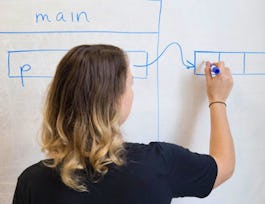Building on the course Programming Fundamentals, this course will teach you how to write code by first planning what your program should do—an important approach for novice and professional programmers. You will learn how to compile and run your program, and then how to test and debug it. This course builds on the Seven Steps you have already learned and provides a framework for systematically testing for problems and fixing them, so you can find and fix problems efficiently.


Writing, Running, and Fixing Code in C
This course is part of Introductory C Programming Specialization
Taught in English
Some content may not be translated



Instructors: Andrew D. Hilton
59,098 already enrolled
Included with 
Course
(776 reviews)
95%
Skills you'll gain
Details to know

Add to your LinkedIn profile
9 quizzes
Course
(776 reviews)
95%
See how employees at top companies are mastering in-demand skills

Build your subject-matter expertise
- Learn new concepts from industry experts
- Gain a foundational understanding of a subject or tool
- Develop job-relevant skills with hands-on projects
- Earn a shareable career certificate


Earn a career certificate
Add this credential to your LinkedIn profile, resume, or CV
Share it on social media and in your performance review

There are 4 modules in this course
In this module, you will learn to write code and do your first assignment in the Practice Programming Environment. You have practiced the first four steps of the Seven Steps in the previous course, and you will review them here before learning Step 5: Translating Your Algorithm to Code. Expert programmers spend most of their time planning before they begin writing code, and you will learn to do the same!
What's included
6 videos21 readings2 quizzes4 programming assignments
Now that you know how to plan an algorithm and translate it to code, you need to learn how to compile and run it! You will learn about the compiler, which takes the code you wrote and translates it into instructions a machine can execute, which you can then run. You will also learn about different options you can give the compiler, as well as different ways to run your program that give you debugging information.
What's included
8 videos14 readings4 quizzes4 programming assignments
Two skills that are crucial to good programming are testing—finding problems with your code, and debugging—fixing them. In this module you will learn systematic ways to identify problems in your code, as well as how to apply the scientific method to fix your program when you do find a bug.
What's included
6 videos15 readings3 quizzes3 programming assignments
In this module you will begin the project you will complete over the course of the rest of the specialization. At the end of each course, you will write a piece of a program that will calculate the odds of different poker hands winning with a Monte Carlo simulation—a way to calculate complicated probabilities by generating random data.
What's included
2 videos1 reading2 programming assignments
Instructors

Offered by
Recommended if you're interested in Software Development

Duke University

Duke University

Copenhagen Business School

California Institute of the Arts
Why people choose Coursera for their career




Learner reviews
Showing 3 of 776
776 reviews
- 5 stars
65.55%
- 4 stars
16.96%
- 3 stars
5.14%
- 2 stars
4.88%
- 1 star
7.45%
New to Software Development? Start here.

Open new doors with Coursera Plus
Unlimited access to 7,000+ world-class courses, hands-on projects, and job-ready certificate programs - all included in your subscription
Advance your career with an online degree
Earn a degree from world-class universities - 100% online
Join over 3,400 global companies that choose Coursera for Business
Upskill your employees to excel in the digital economy
Frequently asked questions
No. Completion of a Coursera course does not earn you academic credit from Duke; therefore, Duke is not able to provide you with a university transcript. However, your electronic Certificate will be added to your Accomplishments page - from there, you can print your Certificate or add it to your LinkedIn profile.
Access to lectures and assignments depends on your type of enrollment. If you take a course in audit mode, you will be able to see most course materials for free. To access graded assignments and to earn a Certificate, you will need to purchase the Certificate experience, during or after your audit. If you don't see the audit option:
The course may not offer an audit option. You can try a Free Trial instead, or apply for Financial Aid.
The course may offer 'Full Course, No Certificate' instead. This option lets you see all course materials, submit required assessments, and get a final grade. This also means that you will not be able to purchase a Certificate experience.
When you enroll in the course, you get access to all of the courses in the Specialization, and you earn a certificate when you complete the work. Your electronic Certificate will be added to your Accomplishments page - from there, you can print your Certificate or add it to your LinkedIn profile. If you only want to read and view the course content, you can audit the course for free.

